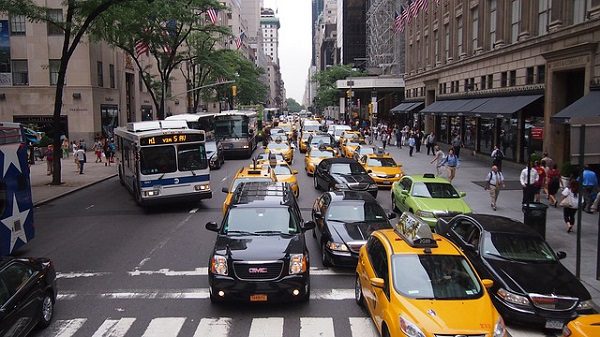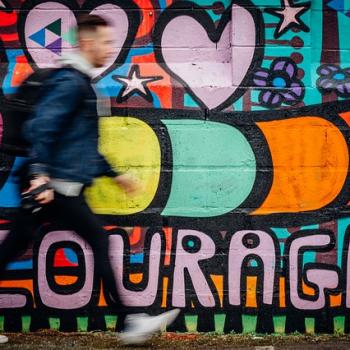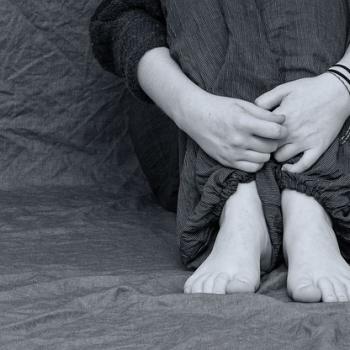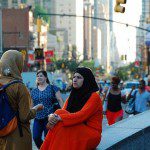This is Day 14 of the #30Days30Writers 2016 Ramadan series.
By Fouad Pervez
“Asalaam alaikum, Fouad,” Abdur-Rahman, a high school freshman with a big smile and mischievous eyes says as he greets me with a handshake. He keeps a straight face, although he starts chuckling soon after. Abdur-Rahman has jumped in front of a good 30 people patiently waiting in line for food. He thinks he’s slick.
“Walaikum asalaam,” I reply, giving him a good amount of side eye and shaking my head. “Good strategy.” I point at the spot where he’s standing in front of me. He’s earned it. It’s suhoor time during one of the odd last 10 nights of Ramadan, and I’m the Pakistani at the Ethiopian masjid in my neighborhood. Like always.
And, as always, the kids want to see if the outsider can be hustled. Alas, I’m from Jersey. You don’t hustle me, I hustle you. Or, in this case, I let it slide.
————————————————————————————————————————————-
I am not sure how unique my Ramadans are, but I tend to spend them in masjids with communities that are not my own. In cities, this is easier, with more masjids and larger, more diverse Muslim populations living near each other. But even in D.C., the Muslim community can often be unintentionally ethnically divided.
I grew up in a very South Asian Muslim community, even though there were many African-Americans, Turkish-Americans, Arab-Americans and other groups living by us. Despite a diverse Muslim community, I grew up knowing the South Asian Muslim life in South Jersey, but missing out on understanding the very real issues and very inspirational lives led by many Muslims in our area.
Whereas our community was, on average, middle-to-upper class, the Muslims we didn’t know as well dealt with harsh racism, political repression and poverty. Whereas we had lawyers and doctors and engineers, they had social workers and people who worked to rehabilitate prisoners. Whereas we never really discussed social or political issues, certainly beyond very abstract discussions, they were activists, labor organizers and people who were involved in multiple movements.
That our communities didn’t connect that often was a negative for all of us.
————————————————————————————————————————————-
Imam Khalid Omer is the leader of the First Hijrah Muslim Community Center, a majority Ethiopian masjid near my apartment. He is a kind and warm person, reflective of the community in his congregation. His English is a bit broken, but his words ring truer and connect better than many imams who have spent their whole lives in this country.
On this afternoon, after talking about the late great Muhammad Ali and his positive impact on the Muslim ummah (collective community), we turn to issues of racism within our community. Imam Khalid takes his time to gather his thoughts before noting a variety of religious and historical references that discuss why this issue is a particular affront to Islam, as well as a very real concern, particularly given current issues:
“We face many problems, Muslims and non-Muslims together. If we are not able to sit with each other, learn from each other, take the best aspects of each other, and care about each other, we will not be able to address these issues.”
The religious references are fairly clear. Surah Hujurat (verse 13) notes that we were made in different nations and tribes so that we may know one another. There is no inherent superiority in any group, and all belong to a larger human family. Surah al-Ma’idah (verse 2) tells us to work with each other, to cooperate for good with all people.
Imam Khalid notes that “we complement one another – we learn from other tribes, and they learn from us. That is the point of this.” There are also numerous hadith in which the Prophet (SAW) decried tribal partisanship, boasting of ancestral glories, and reminded us that all people are children of Adam, and Adam was created from dust.
From the historical record, we know that the Prophet’s (SAW) community did not have differentiations between classes, as superiority was not practiced. Indeed, one of the most beloved Muslims was a freed black slave, Bilal (RAH). The bond of faith is supposed to be far stronger than the bond of tribe.
A “tribe” or sub-group population is not, in itself, a problem in Islam. Indeed, there are many positive characteristics of strong family and ethnic group ties. These groups often make life more manageable, and often are immensely helpful during difficult times. But to stay in one’s tribe is to not follow Allah’s (SWT) call.
The Quran reminds us that we are supposed to find complementary characteristics in other tribes. I’ve told Ethiopians at First Hijrah that they are especially easy-going and funny, which has made it so easy for me to become one of them. In contrast, Pakistanis’ jokes are very insular to our community, and often don’t elicit any response from non-Pakistanis. No Somalian, Ethiopian, or Venezuelan is going to laugh about biryani or lotas.
This applies to many other cultural relics and references – had we spent more time with other communities, we’d be able to teach them more about these, so they could appreciate them. Or … more likely, they’d tell us to write funnier material.
They tell me they admire the dedication of Pakistanis. Granted, they could be joking about this. They also tell me that I’m funny. “Sometimes, brother, sometimes.” Then they all start laughing and give me a hug. Wait … is this pity?
————————————————————————————————————————————-
Imam Khalid’s two younger sons are always around during Ramadan. The youngest is just starting to put together sentences. Imam Khalid calls him “the tornado” because he is always moving, usually in some swirling motion. I get dizzy watching him sometimes, though maybe that’s the fasting (summer days are long, you know).
He comes up to me, eyeing my watch, and asks if I can put it on him. I give him a look of “c’mon, man,” and he responds with a giant smile and eyes that are begging to let him try it. “Okay, okay, but this is too big for you.” I carefully put the watch on his left wrist. Of course, it slides right off. Perplexed he asks me to try the other wrist. Same result, obviously. He tries a few more times, and then concedes that this was not a good idea.
He smiles, gives me a high five, and goes off to find someone else’s watch. Kid’s persistent, I’ll give him that.
His older brother, who can’t be older than five and sometimes stands next to me during salaat, is missing all his front teeth. So when he smiles, it’s hard not to chuckle. We’re having dinner after iftaar, and his father is feeding him. I ask why he’s not eating himself. “I’m going to have my daddy feed me until I’m as big as you!” he says. Everyone erupts in laughter, and his father tells him that “this may be a problem.”
He laughs and flashes a giant, toothless, smile. I see him a few weeks later, and he begrudgingly tells me he has started eating his own food as I get ready to bike home. He makes a sad face, and then starts laughing. He hasn’t mastered the poker face just yet. He’s got time.
————————————————————————————————————————————-
The Islamic Center of D.C. has a wider mix of Muslims. Engineers, doctors and diplomats from Mauritius to Bangladesh to Ghana, to cab drivers and construction workers from Detroit to Pakistan to Somalia. I have spent many years going to Jummah salaat and Taraweeh there and have befriended many people. Most of them, not surprisingly, do not come from my “tribe.”
My favorite interactions are with cab drivers. There are many of them, and they come from a variety of countries. They are almost universally kind, extremely hard-working and devoted to their families. One who I know now has two children studying at the University of Maryland. “I’ve worked very hard, and now my children have an opportunity to do something really good with their lives,” he tells me, with pride.
His son is studying economics and is getting near graduation, so we frequently talk about programs and jobs he should apply for. His eyes light up when he talks about his kids. “Life has been very tough for me, but they won’t have the same struggles, Inshallah.” He always asks me about my parents, work and my dissertation, not always in that exact order.
For many years, the most popular question was: “when are you getting married?” Now, he jokes and asks: “Why are you getting married?” A few cab drivers I know love talking about politics. They love telling me crazy conspiracy theories, because they know I’ll laugh them off and tell them how nothing they said makes any sense.
————————————————————————————————————————————-
The tribal problem amongst Muslims in America should not exist to the extent that it does. I know this as well as anyone, as I was the data analyst and co-author of the Institute for Social Policy and Understanding’s (ISPU) American Muslim Poll that came out earlier this year. We found that, among American religions, Islam was overwhelmingly the most diverse, with three different groups comprising over 15 percent each of the population (with none higher than 25 percent).
Yet, on any number of major issues in America in the past few years, Muslims have not been at the forefront, even though many of us have been affected. We are active on Islamophobia, but not as much on Black Lives Matter. We are now more concerned about the National Security Agency spying on us, but are divided on the Countering Violent Extremism initiative, and that debate does not include many African-American Muslims, who know the potential issues of these types of programs better than any other community.
We have had huge fights the past years over the Muslim Leadership Initiative, the Boycott Divest and Sanction movement against Israel and whether to boycott iftaar dinners put on by the U.S. government, but haven’t been nearly as active on the widening income gap in this country. This is troubling, considering that almost 40 percent of Muslims reported being near or in poverty with annual household incomes of $30,000 or less in the ISPU poll, numbers echoed by the Pew report on American Muslims, which found that 45 percent live in this same level.
Let that sink in.
Almost half of American Muslims are living in or near poverty. As many have written about, Muslims have a serious race problem, particularly South Asians and Arabs. It is undoubtedly a major reason we haven’t been as active as we should, and it is high-time we address it directly.
————————————————————————————————————————————-
Abdur-Rahman and I were talking basketball after Maghrib a few weeks ago. He’s a huge Oklahoma City Thunder fan and was excited that they were on the verge of a huge upset over the record-breaking Golden State Warriors. “You know,” I told him, “they stole that team from Seattle.” Curious, he asks me more.
I told him there are several sports and politics books he should read this summer, as well as a fantastic podcast my friend hosts with some big name guests that he needs to listen to. Sensing this was a homework assignment, he started zoning out. “Um … ok,” he tells me. I know that response. I get it from my undergrads often if I tell them something that won’t be on the midterm. Kids today …
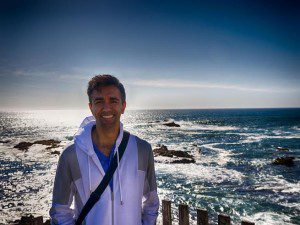
I have obviously grown close to the community at First Hijrah. I’ve built friendships with the many immigrant cab drivers at the Islamic Center. Even had I not already done extensive organizing on labor politics and state violence, after knowing them, it would be impossible for me to not be concerned about police brutality and lack of accountability for violence (and sometimes outright murder) of black children and adults.
It would be impossible for me to not care about the impact of Uber and similar limited regulation transportation services on the livelihood of the cab drivers. Spending time with other tribes forces you to learn about the challenges they face. Caring about them forces you to not be a bystander on these issues.
Silence becomes the voice of complicity, and that is simply not a possibility once you are a member of these communities. They take you in as one of their own, and the bridge goes both ways, as their issues become yours. It is precisely what is supposed to happen.
This is why the Quran tells us to know one another – we must help each other, but we won’t know what help is needed unless we make the effort to join each others’ tribes.
Ramadan is a time of reflection, of trying to become better Muslims. It is a month when we are supposed to purify our souls and try to understand the plight of others in a very direct, physical way, by depriving ourselves of food, water and sleep. It is also a time when we gather more often at masjids and community centers.
This month of piety and righteousness provides us an ideal opportunity to perform critical intra-faith work. Starting this Ramadan, let us make efforts to do that. The reality is that we, as a community, have stood on the sidelines on numerous issues that affect many American Muslims.
Its no surprise that we don’t see members of these communities represented adequately in our leadership organizations. They rarely appear on Muslim panels or in media sources. They may be screaming for help, but their voices are largely silent. The only way we give them voice is to break bread with them.
So this Ramadan, be the Pakistani at an Ethiopian masjid. Be the Arab at an African-American masjid. Be the Turk at a Hispanic masjid. Get busy living Islam.
Fouad Pervez hates writing a biography, but its Ramadan, so he will be cooperative. Fouad is completing his PhD in International Politics at Georgetown University. He founded the There is No Spoon blog, and is the owner of Pervez Photography. He does research on international organizations, drone strikes, international trade, Islamophobia, immigration and health care. He can be reached at fouad0 at gmail dot com. Follow him on twitter: @fpervez1.

